
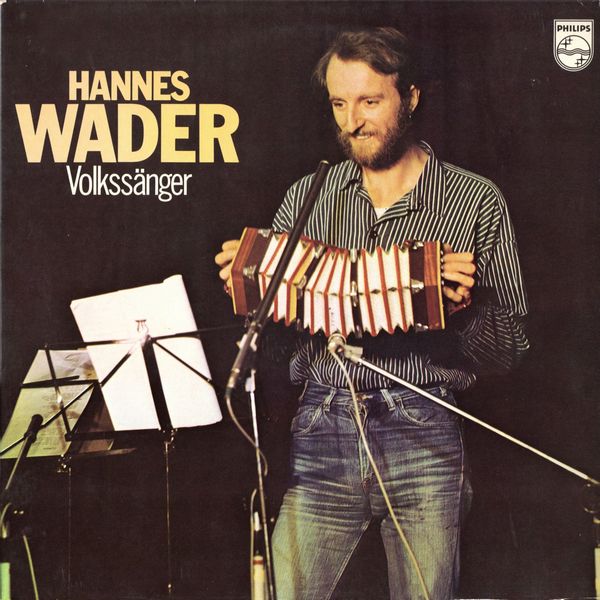 |
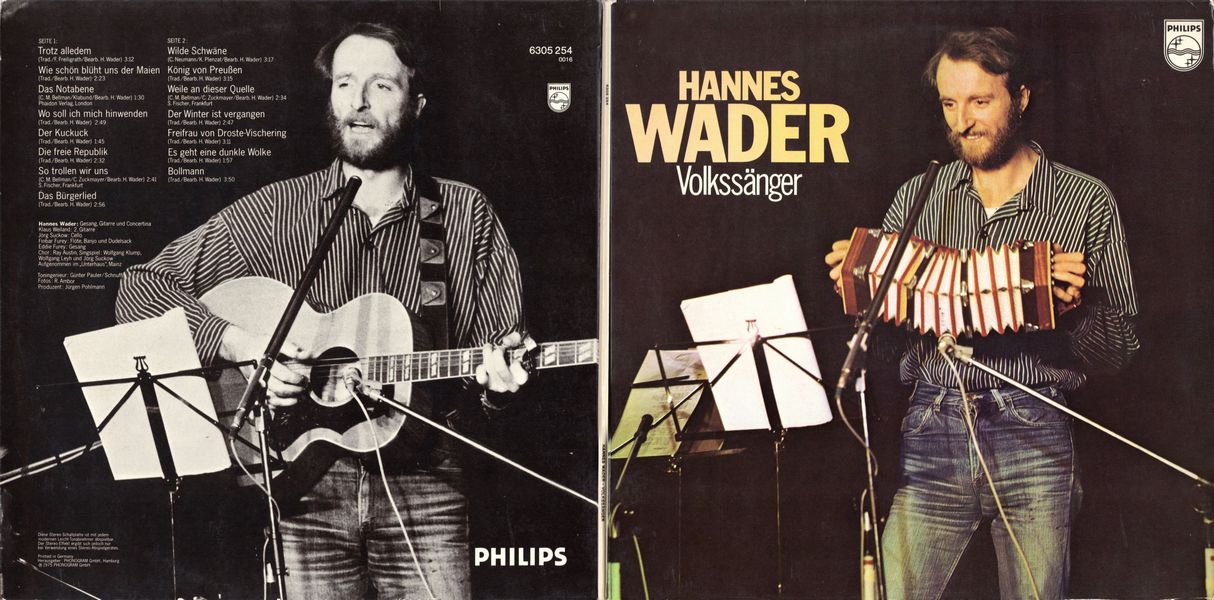
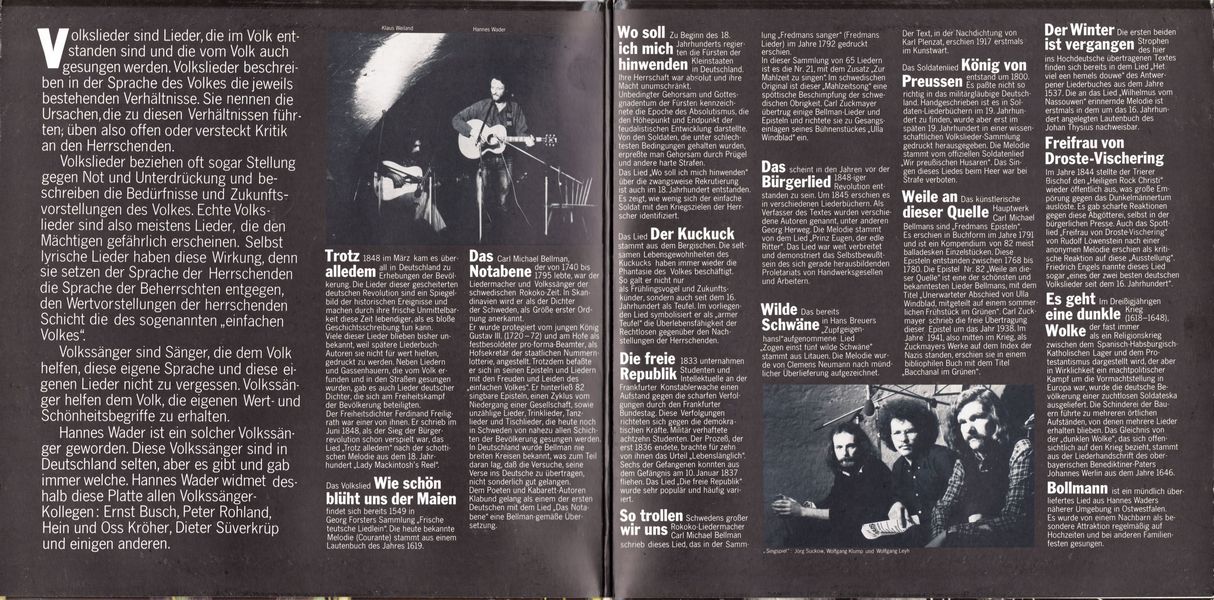
|
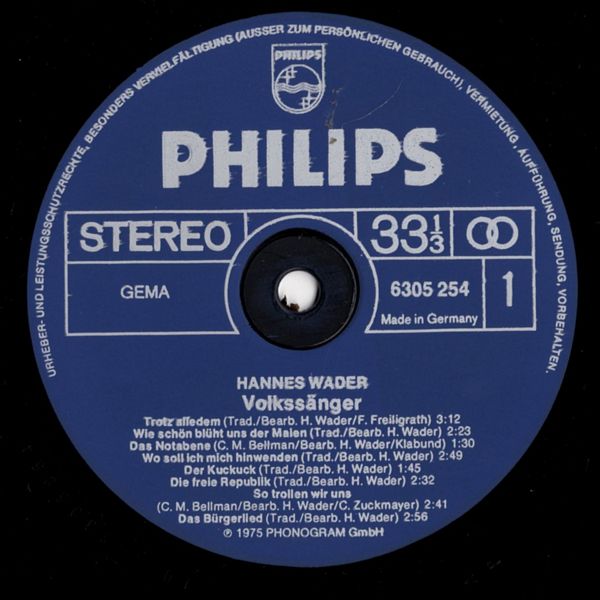
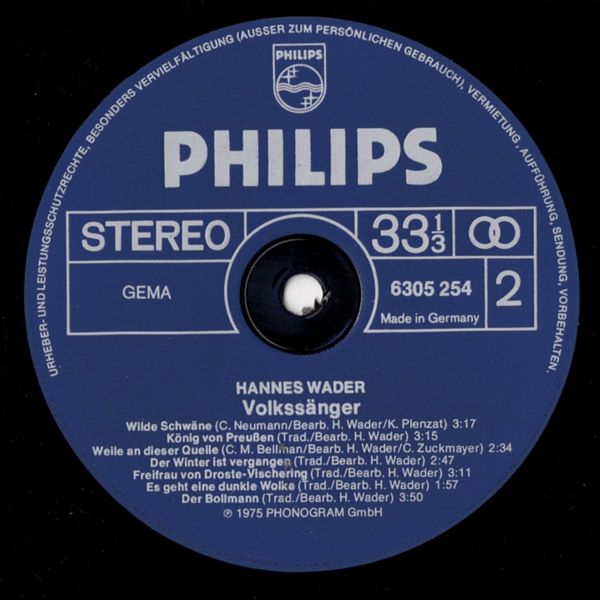 |
Sleeve Notes
Folk songs are songs that were created by the people and that are also sung by the people. Folk songs describe the prevailing conditions in the language of the people. You name the causes that led to these conditions, either openly or covertly, criticizing the rulers.
Folk songs often even take a stand against need and oppression and describe the needs and ideas of the future of the people. Real folk songs are mostly songs that seem dangerous to the mighty. Even lyrical songs have this effect, because they oppose the language of the rulers with the language of the ruled, the values ??of the ruling class with that of the so-called "common people".
Folk singers are singers who help the people not to forget their own language and songs. Folk singers help the people to maintain their own concepts of value and beauty.
Hannes Wader has become such a folk singer. These folk singers are rare in Germany, but there are and always have been. Hannes Wader dedicates this record to all folk singer colleagues: Ernst Busch, Peter Rohland, Hein and Oss Kröher, Dieter Süverkrüp and a few others.
Trotz alledem [In spite of all this], in March 1848, there were all these surveys of the population everywhere in Germany. The songs of this failed German revolution are a reflection of historical events and, through their fresh immediacy, make this time more lively than mere historiography can do.
Many of these songs have remained unknown until now because later songbook authors did not consider them worthy of being printed. In addition to songs and popular songs that were invented by the people and sung in the streets, there were also songs by German poets who took part in the people's struggle for freedom.
The freedom poet Ferdinand Freiligrath was one of them. In June 1848, when the victory of the civil revolution had already been gambled away, he wrote the song "Despite all this" based on the Scottish melody from the 18th century "Lady Mackintosh's Reel".
The folk song Wie schön blüht uns der Maien [How beautifully the May blooms] us can be found in Georg Förster's collection "Fresh teutsche Liedlein" as early as 1549. The melody known today (Courante) comes from a lute book from 1619.
Das Notabene — Carl Michael Bellman, who lived from 1740 to 1795, was the songwriter and folk singer of the Swedish Rococo period. In Scandinavia he is recognized as the poet of the Swedes, the greatness of the first order.
He was sponsored by the young King Gustav III. (1720-72) and employed at the court as a permanent pro forma official, as court secretary of the state number lottery. Nevertheless, he dealt in his epistles and songs with the joys and sorrows of the "common people". He left 82 singable epistles, a cycle of the decline of a society, as well as innumerable songs, drinking songs, dance songs and table songs that are still used in Sweden today by almost be sung to all strata of the population. In Germany, Bellman was never widely known, partly because attempts to translate his verses into German did not go particularly well.
The poet and cabaret writer Klabund was one of the first Germans to succeed with the song "Das Nota bene", a translation that would suit Bellman.
Wo soll ich mich hinwenden [Where should I turn] — At the beginning of the 18th century, the princes of the small states ruled in Germany. Their rule was absolute and their power absolute.
Unconditional obedience and divine grace of the princes marked the epoch of absolutism, which represented the climax and end point of the feudal development. Obedience was extorted from the soldiers who were held in the worst of conditions by beatings and other severe punishments.
The song "Where should I turn" about compulsory recruitment was also written in the 18th century. It shows how little the common soldier identifies with the war aims of the rulers.
Das Lied Der Kuckuck [The song The Cuckoo] comes from the Bergisch region. The strange habits of the cuckoo have repeatedly occupied the imagination of the people.
He was not only seen as a spring bird and herald of the future, but also as a devil since the 16th century. In the present song he symbolizes as the "poor devil" the ability of the outlawed to survive against the stalking of the rulers.
Die freie Republik [The free republic] — In 1833, students and intellectuals at the Frankfurt Konstablerwache rebelled against the severe persecution by the Frankfurt Bundestag. These persecutions were directed against the democratic forces. The military arrested eighteen students. The trial, which only ended in 1836, resulted in ten of them being sentenced to life in prison. Six of the prisoners escaped from the prison on January 10, 1837. The song "The Free Republic" became very popular and varied frequently.
So trollen wir uns [So we troll] — Sweden's great Rococo songwriter Carl Michael Bellman wrote this song, which appeared in print in 1792 in the Fredmans sanger collection.
In this collection of 65 songs, it is number 21, with the addition "To sing with the meal". In the Swedish original, this "meal song" is a mocking abuse of the Swedish authorities. Carl Zuckmayer transferred some Bellman songs and epistles and arranged them for singing in his play "Ulla Windblad".
The Bürgerliedseems to have originated in the years before the 1848 revolution. It appeared in various song books around 1845. Various authors were named as the authors of the text, including Georg Herweg. The melody comes from the song "Prinz Eugen, the noble knight". The song was widespread and demonstrates the self-confidence of the emerging proletariat of journeymen and workers.
Wilde Schwäne [Wild swans] — The song "once pulled five wild swans", which was already recorded in Hans Breuer's "Zupfgeigen-hansl", comes from Lithuania. The melody was recorded orally by Clemens Neumann.
The text, in Karl Plenzat's adaptation, first appeared in the Kunstwart in 1917.
The soldier's song, König von Preussen [King of Prussia], was written around 1800. It didn't really fit into Germany, which was a believer in the military. It can be found handwritten in 19th century soldiers' songbooks, but was not published in printed form until the late 19th century in a scholarly collection of folk songs. The melody comes from the official soldier song "We Prussian Hussars". Singing this song in the army was forbidden under penalty.
Weile an dieser Quelle [While at this source] — The main artistic work of Carl Michael Bellman are "Fredman's Epistles". It was published in book form in 1791 and is a compendium of 82 mostly ballad-like individual pieces. These epistles were written between 1768 and 1780. Epistle no. 82 "A while at this source" is one of Bellman's most beautiful and best-known songs, with the title "Unexpected farewell to Ulla Windblad, communicated on a summer breakfast in the country". Carl Zuckmayer wrote the free transcription of this epistle around 1938. In 1941, in the middle of the war, when Zuckmayer's works were on the Nazi index, it appeared in a bibliophile book entitled "Bacchanal in the Green".
Der Winter ist vergangen [The winter has passed] — The first two stanzas of the text, which has been translated into High German here, can already be found in the song "Het viel een hemels douwe" in the Antwerp songbook from 1537. The melody, which is reminiscent of the song "Wilhelmus vom Nassouwen", is for the first time in the 16th century lute book of Johan Thysius verifiable.
Freifrau von Droste-Vischering [Baroness of Droste-Vischering] — In 1844 the Bishop of Trier exhibited the "Holy Rock of Christ" again in public, which caused great outrage against the dark. There were sharp reactions against this idolatry, even in the bourgeois press. The mocking song "Freifrau von Droste-Vischering" by Rudolf Löwenstein, based on an anonymous melody, also appeared as a critical reaction to this "exhibition". Friedrich Engels even called this song "one of the two best German folk songs since the 16th century".
Es geht eine dunkle Wolke [There is a dark cloud] — In the Thirty Years' War (1618-1648), which is almost always portrayed as a religious war between the Spanish-Habsburg-Catholic camp and Protestantism, but which was in reality a power-political struggle for supremacy in Europe, the German population became a disgraceful soldier delivered. The toil of the peasants led to several local uprisings, several of which have survived. The parable of the "dark cloud", which obviously refers to the war, comes from the song manuscript of the Upper Bavarian Benedictine priest Johannes Werlin from 1646.
Bollmann is an orally transmitted song from Hannes Wader's vicinity in East Westphalia. It was regularly sung by a neighbor as a special attraction at weddings and other family celebrations.
Sleeve notes translated from Gernan via Google Translate.